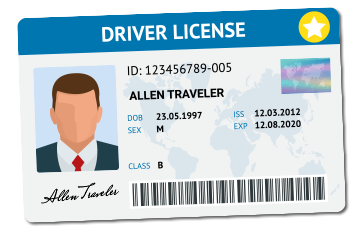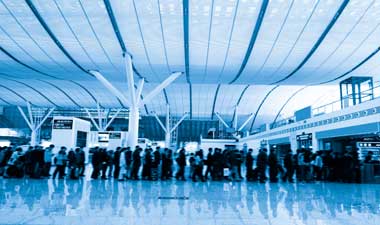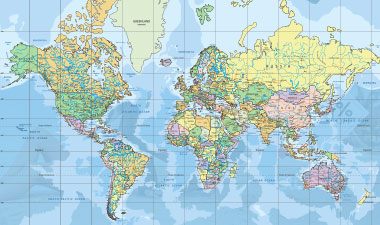The Department of Homeland Security REAL ID Act - Update
The Department of Homeland Security has updated its webpage with which states are compliant and which states have an extension, To view that list go to: www.dhs.gov/real-id.
Q: What is REAL ID?
Passed by Congress in 2005, the REAL ID Act enacted the 9/11 Commission's recommendation that the Federal Government “set standards for the issuance of sources of identification, such as driver's licenses.” The Act established minimum security standards for state-issued driver's licenses and identification cards and prohibits Federal agencies from accepting for official purposes licenses and identification cards from states that do not meet these standards. These purposes are:
Accessing Federal facilities
Boarding federally regulated commercial aircraft
Entering nuclear power plants
Q: When will REAL ID be enforced?
The final enforcement deadline is May 3, 2023. By this date, not only must all states be issuing Real ID-compliant licenses or IDs, but individuals must also have visited their state’s driver’s licensing agency and obtained a REAL ID compliant card, or acceptable alternative such as a U.S. passport, if they wish to fly on commercial aircrafts or access federal facilities.
Q: What happens on May 3, 2023?
Federal agencies, including DHS and TSA, may only accept state-issued driver’s licenses and identification cards as identification for purposes of accessing federal facilities - including TSA airport security checkpoints - if the license or card was issued by a REAL ID compliant state in accordance with the REAL ID security standards (meaning the license or card must include the REAL ID compliant star marking). Enhanced Driver’s Licenses (EDL) issued by Washington, Michigan, Minnesota, New York, and Vermont are considered acceptable alternatives to REAL ID-compliant cards and will also be accepted for official REAL ID purposes. Most EDLs do not contain the star marking and this is acceptable.
Q: Are all states issuing REAL ID compliant cards?
DHS is working closely with all states and territories to provide assistance and guidance to achieve full compliance by the May 3, 2023 deadline. As of September 5, 2019, 50 states and territories are fully compliant with the REAL ID requirements, and all states are on track to begin issuing compliant licenses and IDs by the May 3, 2023 deadline.
Q: How do I get a REAL ID?
Visit your state’s driver’s licensing agency website to find out exactly what documentation is required to obtain a REAL ID. At a minimum, you must provide documentation showing: 1) Full Legal Name; 2) Date of Birth; 3) Social Security Number; 4) Two Proofs of Address of Principal Residence; and 5) Lawful Status.
States may impose additional requirements, so check with your state’s driver’s licensing agency website, before visiting them in person, for additional guidance and assistance.
Q: How do I know if my license or identification card is REAL ID compliant?
REAL ID-compliant cards will have of one of the following markings on the upper top portion of the card. If the card does not have one of these markings, it is not REAL ID-compliant and won’t be accepted as proof of identity in order to board commercial aircraft.
Examples:
Q: When will I need to change how I travel domestically?
Beginning May 3, 2023, every state and territory resident will need to present a REAL ID compliant license/ID, or another acceptable form of identification, for accessing Federal facilities, entering nuclear power plants, and boarding commercial aircraft. The card, itself, must be REAL ID compliant unless the resident is using an alternative acceptable document such as a passport or passport card, or state-issued Enhanced Driver’s License. The Act does not require individuals to present identification where it is not currently required to access a Federal facility (such as to enter the public areas of the Smithsonian) nor does it prohibit an agency from accepting other forms of identity documents (such as a U.S. passport or passport card).
Q: Will minors need to have driver's licenses/ identification cards to fly domestically?
No. TSA does not require children under 18 to provide identification when traveling with a companion within the United States. The companion will need acceptable identification.
Q: What happens to travelers who show up without a compliant license? Will TSA turn them away?
Travelers who do not present a REAL ID-compliant license or acceptable alternative beginning May 3, 2023 will not be permitted through the security checkpoint.
Q: Is a passport my only other option?
No. TSA accepts several other forms of identity documents. For more information on acceptable forms of identification for boarding aircraft, please visit TSA’s website at https://www.tsa.gov/travel/security-screening/identification.
Starting May 3, 2023, every state and territory resident will need to present a REAL ID compliant license/ID, or another acceptable form of identification, for accessing Federal facilities, entering nuclear power plants, and boarding commercial aircraft. The card, itself, must be REAL ID compliant unless the resident is using an alternative acceptable document such as a passport. The Act does not require individuals to present identification where it is not currently required to access a Federal facility (such as to enter the public areas of the Smithsonian) nor does it prohibit an agency from accepting other forms of identity documents (such as a U.S. passport or passport card).
Q: Can I use my REAL ID card to cross the border into Canada and Mexico and for international travel?
No. REAL ID cards cannot be used for border crossings into Canada, Mexico or other international travel.
Q: Can I use my REAL ID for sea (cruise) travel?
No. REAL ID cards cannot be used for international sea cruise travel.
Q: Do I need a passport if I have a REAL ID?
If you are traveling internationally you will still need your passport. If you are traveling domestically, you will only need one valid form of identification – either your REAL ID or another acceptable alternative such as a passport, not both.
Q: What type of state-issued driver’s licenses and identification cards does the Department of Homeland Security currently accept as identification to access its buildings and facilities and at TSA airport security checkpoints?
Until full enforcement of REAL ID begins on May 3, 2023, DHS and its component agencies, including TSA at its airport security checkpoints, will continue to accept for identification purposes all state-issued driver’s licenses and identification cards issued by compliant states, as well as noncompliant states with a valid extension.
Q: Will a federal agency accept my Enhanced Driver's License?
Yes. State-issued Enhanced Driver's Licenses (EDLs) are designated as acceptable border-crossing documents by DHS under the Western Hemisphere Travel Initiative and are acceptable alternatives for official federal purposes such as accessing a Federal facility or boarding a commercial aircraft. Individual agency policies may still apply.
Michigan, Minnesota, New York, Vermont, and Washington are the only states that currently issue EDLs. For more information on EDLs, please go to https://www.dhs.gov/enhanced-drivers-licenses-what-are-they.
Q. What about non-DHS federal entities? What types of licenses and identification cards will they accept for access purposes?
Federal agencies have the authority to set their own minimum security access requirements and, if desired, decide not to accept noncompliant marked cards before the May 3, 2023 deadline.
For example, The U.S. Department of Defense (DoD) recently finalized an update to its DoD-wide installation security policy and is in the process of no longer accepting noncompliant marked cards across all of its facilities and installations. However, DoD will continue to accept state-issued noncompliant unmarked "legacy" cards until the May 3, 2023 deadline.
To ensure you have the proper identification, DHS recommends that you contact the federal agency you plan to visit in advance, to obtain information regarding identification requirements.
As a reminder, the REAL ID Act applies when an individual presents a state-issued driver’s license or identification card to a federal agency for an “official purpose” as defined in the Act and regulations, such as boarding a federally regulated commercial aircraft. Although a REAL ID card may not be necessary for other purposes such as driving, voting, banking, or applying for benefits or employment, we recommend checking with the relevant state, local, or commercial entities regarding their specific identification requirements.
Q: Is DHS trying to build a national database with all of our information?
No. REAL ID is a national set of standards, not a national identification card. REAL ID does not create a federal database of driver license information. Each jurisdiction continues to issue its own unique license, maintains its own records, and controls who gets access to those records and under what circumstances. The purpose of REAL ID is to make our identity documents more consistent and secure.
Q: How does REAL ID implementation impact states that provide driver's licenses and IDs to certain non-citizens/undocumented immigrants?
REAL ID allows compliant states to issue driver's licenses and identification cards where the identity of the applicant cannot be assured or for whom lawful presence is not determined. In fact, some states currently issue noncompliant cards to undocumented individuals. Noncompliant cards must clearly state on their face (and in the machine readable zone) that they are not acceptable for REAL ID purposes and must use a unique design or color to differentiate them from compliant cards. DHS cautions against assuming that possession of a noncompliant card indicates the holder is an undocumented individual, given that individuals may obtain noncompliant cards for many reasons unrelated to lawful presence. Possession of a noncompliant card does not indicate that the holder is an undocumented individual, given that individuals may obtain noncompliant cards for many reasons unrelated to lawful presence.
Credit: https://www.asta.org/

News & Blog Categories
Trending Posts
Recent Posts

Real ID Deadline Extension
Starting on May 3, 2023 travelers who elect to use a state-issued driver’s license at Transportation Security Administration (TSA) airport checkpoints must ensure that they are Real ID-compliant, which is designated by a star in a circle in the upper right corner of the license. Read More





